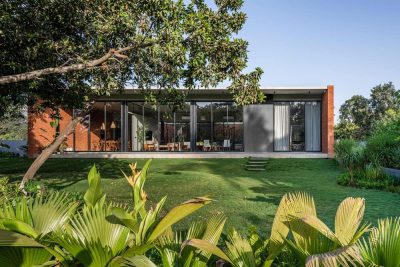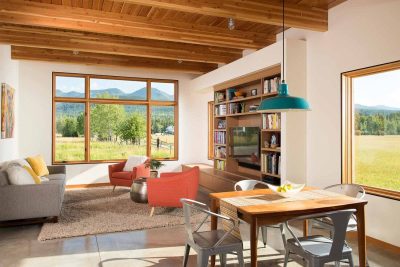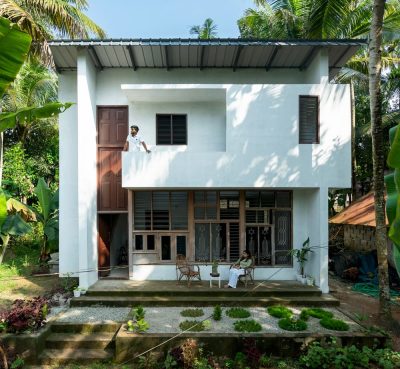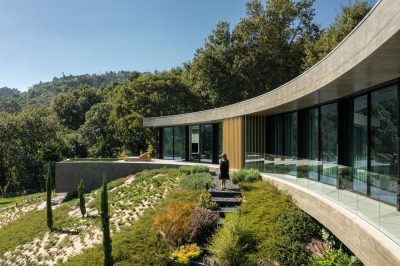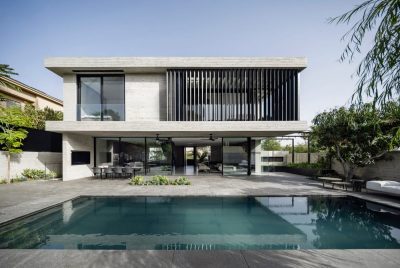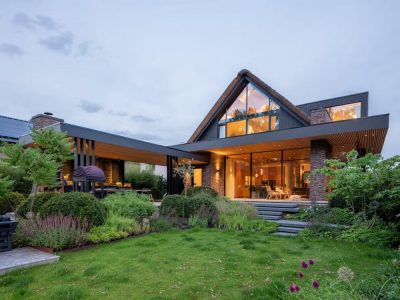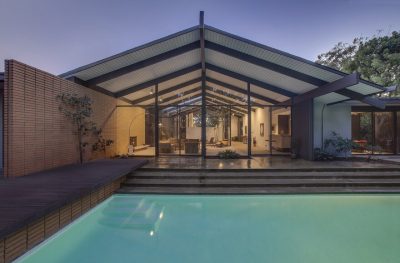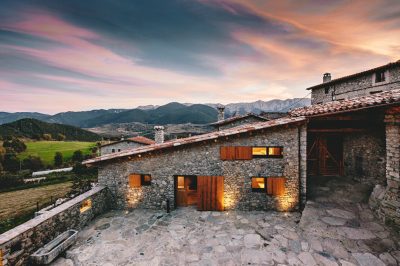
Project Name: Box of Light House
Design Firm: CUN Design
Chief Designers: Cui Shu & Na Mula
Project Location: Beijing, China
Project Area: 1000 m2
Design Date: October 2021
Completion Date: April 2023
In the last two decades of rapid real estate development, housing has been mass-produced as a commodity, gradually veering away from meeting users’ needs. Moreover, the influx of artistic concepts and repetitive styles has led to a blurred identity in houses available in the market.
Fortunately, our project situated in Heguangchenyue stands as a unique and high-quality development amid the market upheaval. It expresses care for the city and profound thoughts on aesthetic advancement through the aesthetics of light. The architectural design incorporates numerous actions to introduce natural light, making it the unequivocal protagonist within the space.
Light, an everlasting creative motif in architecture and space, poses a challenge that every designer aspires to tackle. In this case’s design concept, the focus is also on “light,” with a substantial introduction of light into the existing space. Beyond simply introducing light, the meticulous control exercised by Cui Shu over the light is evident, ultimately using space as a medium to master light and employing different light sources to reshape distinct spaces.

The five-story villa space is logically divided into two parts – the first to third floors are designated for the family’s living and dining requirements.
Upon entering, the double-height foyer space and continuous L-shaped floor-to-ceiling glass windows offer an expansive visual experience, creating an infinite sense of extension.
In this public area, serving as the primary guest and dining space, the interior is not overly designed. Instead, the integration of courtyard scenery with the interior establishes a unique domain where natural daylight and life scenes blend. This interplay defines the subject-object relationship between viewing and being viewed.

Cui Shu has intentionally fragmented the initially open and continuous spaces, connecting them via walkways scaled to human proportions. This effectively segregates different functional spaces to ensure privacy while fostering diverse and engaging spatial relationships among family members.
The top-floor master bedroom space, offering the utmost privacy, has been strategically compartmentalized to accommodate the basic life of a small family unit. While the scale of circulation space across all three floors is intentionally manipulated, the intervention of scenery and light has transformed corridors from passive transit zones into garden-like passages with varying vistas. This design imbues the home space with the essence reminiscent of ancient Chinese paintings, vividly illustrating all daily activities as if they leap off the canvas.
“Chinese gardens are envisioned as realms of imagination; their surroundings are a deliberate construct, their lifestyle embodies a philosophical approach, and their universe encapsulates a dreamlike essence. True satisfaction is believed to be reserved for those detached from the worldly concerns. In essence, a Chinese garden is often regarded as a manifestation of a dream.” — Tong Jun, “Lun Yuan”

Unlike the daily routines of the family upstairs, the two underground floors resemble a sanctuary for the homeowner’s inner self. Following a meticulous arrangement of spatial flows, the staircase relocates to the heart of the area. With its straightforward and gentle ascent, the stairs act as an avenue signaling transition and connection, inviting one to venture into the subterranean spiritual haven while providing an avenue back to the reality bathed in natural sunlight.
Cui Shu has adeptly employed sophisticated architectural techniques underground, crafting a series of ‘boxes’ within the interior architecture. These boxes, varying in size and interwoven across different elevations, engender a richly layered composition of intimate spaces. The interplay of inclined light, manifesting progressions, gradations, and extensions, coupled with the high-ceiling atrium and diverse strip windows diffusing subtle rays, evokes moments of sanctity akin to the ambiance found within Langxiang Church. It’s a space nurturing spiritual resonance for its inhabitants.

The bar space, in an unexpected turn, embraces a design vocabulary primarily comprising soft and futuristic curves, starkly diverging from the overarching design language. This configuration, resembling a spacecraft materializing within the home, invites an ethereal experience. Ascending the stairs, settling in evokes the sensation of voyaging through tranquil space, disengaged from the conventional reality, experiencing a weightless detachment.
The teahouse encapsulates the mystique found in ‘In Praise of Shadows,’ employing strip windows that allow faint light from the atrium to delicately seep through. The presence of goldfish within a fish tank imparts dynamism to the space, almost ‘crafting’ a dreamlike vista. It is a space where leisurely living converges with poetic ambiance. In the courtyard, light filtering from above paints dappled shadows of trees on the walls. A glass brick half-wall frames an obscure yet intriguing window view, infusing the underground with a hint of luminance and vitality.
Cui Shu ardently strives to comprehend the vivid and distinct life experiences of individuals, adopting a life-centric approach to spatial operations in sync with the contemporary era. Leveraging years of professional expertise and aesthetic acumen, this creation marks the inaugural endeavor within the ‘box’ series. Future projects will further delve into the personalized concept of ‘home’ through an array of residential explorations.






